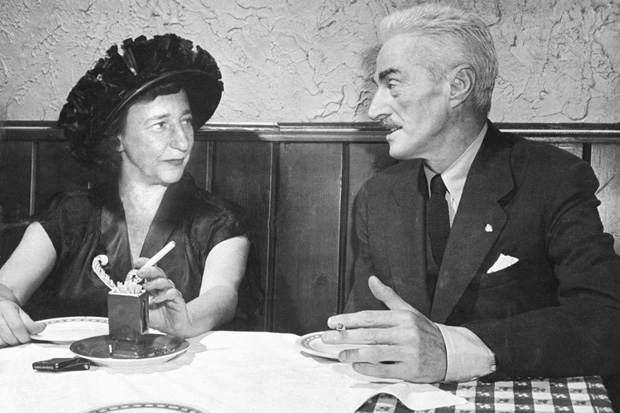Lillian Hellman must be a maddening subject for a biographer. The author Mary McCarthy’s remark that ‘every word she writes is a lie, including “and” and “the”’ wasn’t far off. Navigating through the hall of mirrors that Hellman left behind, trying to sort fact from self-aggrandising fiction, seems to have worked Dorothy Gallagher into a fury. Perhaps this book is her revenge.
One of America’s most successful playwrights, Hellman had her first Broadway hit before she was 30. She was a close friend of Dorothy Parker and her long-term lover was Dashiell Hammett. Ardently left-wing, she was summoned before Joseph McCarthy’s House Un-American Activities Committee to answer questions about her links with the Communist party. By Gallagher’s reckoning, she was a disloyal friend, a co-dependent writer and an out-and-out Stalinist.
This whistle-stop biography focuses on the controversies of Hellman’s life, and she does not come out well from any of them. In her four volumes of memoirs, she presented herself as a principled, compassionate heroine, but it seems they were only very loosely based on the truth. The most shameless departure from the facts was a chapter of her 1973 autobiography that became the film Julia. It describes a daring mission smuggling money through Nazi Germany for a childhood friend. Gallagher points out that the dates don’t stack up, and what’s more, it seems she picked up the story from someone else. When the real Julia became curious and wrote to Hellman, she pretended she’d never received the letter. Gallagher is bracingly indignant:
Hellman might have called her stories fiction and been judged on literary merit alone. Instead, she promised that she had not fooled with the facts of her life, all the while crossing and re-crossing the frontier without a by-your-leave. Like the man who comes courting without mentioning the wife and children at home, she wanted something for nothing.
Hellman was always a bit shifty about her own politics and Gallagher systematically goes about uncovering a trail of intellectual dishonesty. On a visit to Moscow in 1944, Hellman seems wilfully to have ignored evidence that artists and writers were being killed off. Years later she stood by the Russian government’s cover stories and even made up some of her own. She was given rare access to the front lines when the Russian army was camped outside Warsaw, and never described what she saw there. Odder still, she claimed she had had an invitation to meet Stalin, but had turned it down as she didn’t think they’d have anything to say to each other. Gallagher doesn’t buy it:
When it would be appropriate to mention a significant historical event, she omits; when it is unavoidable, she refuses to engage. She dissembles when approaching politically sensitive material, hedges, misleads.
This book isn’t all moral disapproval, and at times Gallagher enjoys her protagonist’s barefaced misinformation campaign. When Hellman appeared before the Un-American Activities Committee, she refused to name names. In her account of it, someone from the gallery cheered, ‘Thank God someone finally had the guts to do it.’ As she wasn’t the first to refuse to talk, this was a rather strange thing to say, and as her biographer drily remarks, ‘No one else in the crowded committee room that day could recall hearing it.’
Some of Gallagher’s other lines of inquiry don’t yield as much and can seem a little harsh. There’s a weird chapter about the similarities and differences between Hellman and Gertrude Stein, even though they only met once, very briefly and didn’t have much in common. The case for Hellman the anti-Semite is circumstantial at best, and perhaps there’s a little too much emphasis on Dashiell Hammett’s influence on her work.
Hammett was appalling. Viciously drunk, manipulative and controlling, he once punched Hellman in the face so hard she fell to the floor at a party; he enjoyed laughing about how he’d done the crossword over a woman’s shoulder while having sex with her. He wrote to Hellman:
If you had any memory… you’d know that your present dithers over the play are only the normal bellyaching of La Hellman at work. You still think you dashed those plays off without a fear, a groan or a sigh; but you didn’t, Sister: I haven’t had a dry shoulder since your career began.
If Hellman had written something like that, Gallagher wouldn’t have believed a word of it. It’s clear that Hellmann and Hammett did work closely together, but the latter is practically given a co-writer credit for most of the Broadway successes.
Still, Gallagher has had to wade through a lot of Hellman’s nonsense to get anywhere close to an accurate picture of what actually happened. This snappy biography is full of piquant details and entertaining quotations, and it’s perhaps understandable that its author was ready to stick the knife in.






Comments